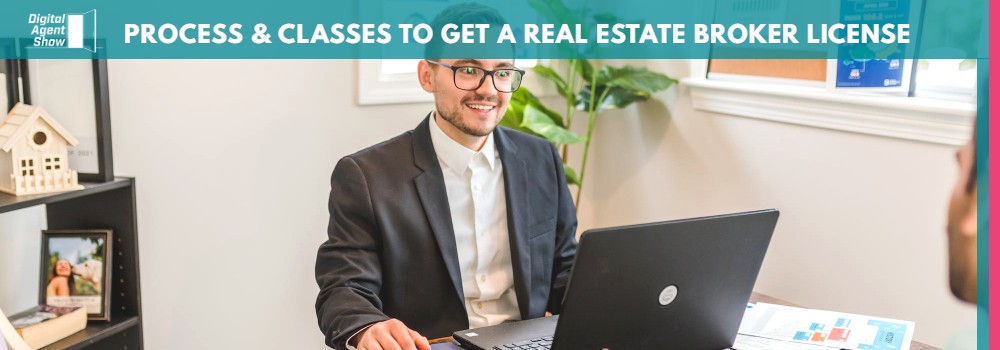Process & Classes to Get a Real Estate Broker License
Moving up in your real estate career is bound to unlock a more significant income potential and raise your credibility. As a real estate sales agent, your next logical consideration is obtaining a real estate broker license. But what process and classes would you need to get your real estate broker license?
The process to get your real estate broker license entails taking a real estate broker license course, passing a broker’s licensing exam, applying for the license and setting up your brokerage firm, or being an associate broker. Real estate classes cover subjects on managing a brokerage firm.
This article will explain how a real estate agent and broker differ, what a real estate broker does, the benefits of being licensed as a broker, the process of getting licensed, and the classes you’ll need to attend to be licensed.
How Does a Real Estate Agent and a Real Estate Broker Differ?
The terms real estate agent, realtor, and real estate broker are most often used interchangeably in the state of Illinois and Colorado. For instance, new real estate agents are referred to as brokers. But what’s the difference?
- Real Estate Agents are state-licensed salespeople who facilitate the buying and selling of real properties, get paid commissions for closed deals, and work under a broker.
- Real Estate Brokers have acquired further education and experience and have a real estate broker license, enabling them to work as independent agents. Other agents can work for them.
Types of Real Estate Brokers
Real estate brokers are broadly categorized as:
- Broker-owner: This is the person who takes legal responsibility for the functions of a brokerage firm.
- Associate-broker: You are an associate-broker when you have acquired your real estate broker license but practice under a broker-owner.
What Does a Real Estate Broker Do?
Working as a broker is a financially rewarding but challenging role. Here are some principal functions of a real estate broker:
- Help clients buy and sell properties: Like agents, brokers are authorized by the state to help people buy and sell their properties by listing and marketing properties, and assessing the needs of potential home buyers.
- Marketing: According to the National Association of Realtors, 106,548 brokerage firms operate in the US and about 1.4 million realtors who are members of the trade organization. It takes aggressive marketing to stand out amidst the fierce competition.
- Customer service: Respond to inquiries from prospective clients, handling complaints about ongoing transactions, or sales agents.
- Sales lead generation and management: As a broker, you and your agents run sales initiatives that generate leads. You are responsible for tracking and closing these sales.
- Human resource management: A broker’s license will allow you to own a brokerage firm that can employ real estate agents as agents are not allowed to operate independently. As a broker, you’ll be responsible for managing the performance and remuneration of your sales agents.
The real estate industry thrives on the infrastructure that real estate brokers provide. They support agents by providing technical support, coaching, marketing, and listings.
What Are the Benefits of Getting a Real Estate Broker License?
Apart from flexible working hours, decent pay, and the satisfaction of helping people get their dream homes, there are other reasons you need to have a real estate broker license.
- Greater work flexibility: As a licensed broker, you can work independently, unlike an agent who can only work with a broker. Besides, if you become an associate broker, you can opt to focus on a brokerage firm’s administrative duties instead of the hustle of running a whole firm.
- Greater credibility: Getting a broker license implies you are an experienced real estate professional. The fact that you have undergone additional rigorous training enhances your professional credibility further. You can leverage this to win more significant sales from clients who can trust you more.
- Enhanced income: As a broker, you work independently and earn the entire amount, unlike an agent who receives a commission. Moreover, you can make more via the agents who bring business to your brokerage firm. (Some experienced agents accomplish this by creating a team structure while still associated with a brokerage.)
In a related article, I explore whether now is a good time to get into real estate.
What Is the Process of Getting a Real Estate Broker License?
Firstly, you need to satisfy the minimum eligibility criteria as stipulated by your state. Then enroll in a training course that is accredited by your state. Here’s how it all pans out:
Research Your Eligibility for a Real Estate Broker License
The particular requirements to obtain a real estate broker license vary depending on the state. But we do have certain irreducible minimums for the licensure exam. You should:
- Be a legal US resident.
- Be at least 18 years.
- Education minimums; a high school diploma.
- Be a licensed real estate agent.
- Have several years of active practice as a licensed real estate agent; the duration in most states is 2-4 years. A bachelor’s degree in a relevant field can substitute this requirement.
- Pass a criminal background check.
Undertake the Real Estate Broker Pre-Licensing Course
After you’ve confirmed that you are eligible for a broker’s license, you’ll be required to undertake a pre-licensing real estate broker education offered by an institution accredited in your state. Choose the most suitable and cost-effective to manage your real estate broker license costs.
- Real estate brokers license online courses (Cost: $119-$900): Many online schools offer real estate courses over the internet. Online courses are convenient and flexible as you learn at your pace. Here’s a review of the top real estate broker licensing courses online.
- Real estate schools in your locality (Cost: $750): Get recommendations for real estate schools in your area from real estate professionals or local real estate associations. They offer these courses in-person or virtually.
- Community colleges (Cost: $600-$5,000): Appropriate if you prefer in-classroom sessions. The community college covers the fundamental basic courses needed for a real estate broker license, although course electives are not as vast as in a university set-up. The course duration is around two years.
- Universities (Cost: $45,000-$57,000): These are typically four-year bachelor’s degree courses. They are costly and lengthy, but the coverage is quite extensive. To appraise a university’s program check for accreditation in your state, whether it covers units in associate brokerage and if the program is available online.
The courses will usually cover the following subjects:
- Property Management
- Human Resources Management
- Business and Real Estate Law
- Real Estate Practices and Procedures
- Mortgage Brokers Laws and Rules
- Property Management Practices
Apply to Take the State Real Estate Broker’s License Test
Once you have satisfied the eligibility criteria and covered the necessary pre-licensing real estate broker’s course, apply to take the examination by submitting the relevant paperwork.
Although the test varies from one state to another, usually they’re 100+ multiple choice-type questions. Common topics you may expect in your state licensure exam will include:
- Property Ownership and Land Use Controls and Regulations
- Laws of Agency
- Valuation and Market Analysis
- Financing
- Transfer of Property
- The Practice of Real Estate and Mandated Disclosures
- Contracts
Set Up Your Brokerage Firm or Work as an Associate-Broker
Finally, after you have sat and passed your state broker licensure test, you’ll obtain a brokers license. As a licensed broker, you can work independently or work as an associate broker with another broker.
Note that you still need to periodically (usually every 2-4 years) take continuing education courses to renew your license, and also to be up to date in the industry.
We recommend registering with the National Association of Realtors (NAR) to be recognized as a realtor. Once you’ve registered as a member, you enjoy enhanced industry credibility and access to educational materials to speed up your career growth and tools to land better deals and contracts.
What Is Real Estate Broker License Reciprocity?
Real estate license reciprocity refers to an agreement between states that allows for agents or brokers licensing in reciprocal states. Reciprocity implies that you can be licensed to practice in other states with a real estate license reciprocity with your state.
This is a lifeline for brokers living near borders as it allows for uninterrupted business across reciprocal states. It also enables the actualization of inter-state online real estate business by providing the necessary legal mechanism.
There are five states in the US with full license reciprocity; Virginia, Colorado, Alabama, Maine, and Mississippi.
Conclusion

We’ve noted that you must meet the state eligibility criteria to obtain a real estate broker license in your state. You’ll then have to pass a state licensure exam. Once you become a licensed broker, you’ll need to fulfill continuing education regulations to maintain certification and be up to date in the industry.
If you are not eligible for getting a Broker license because you are new in the business, you can check out my article on the 7 steps to getting your real estate license.







